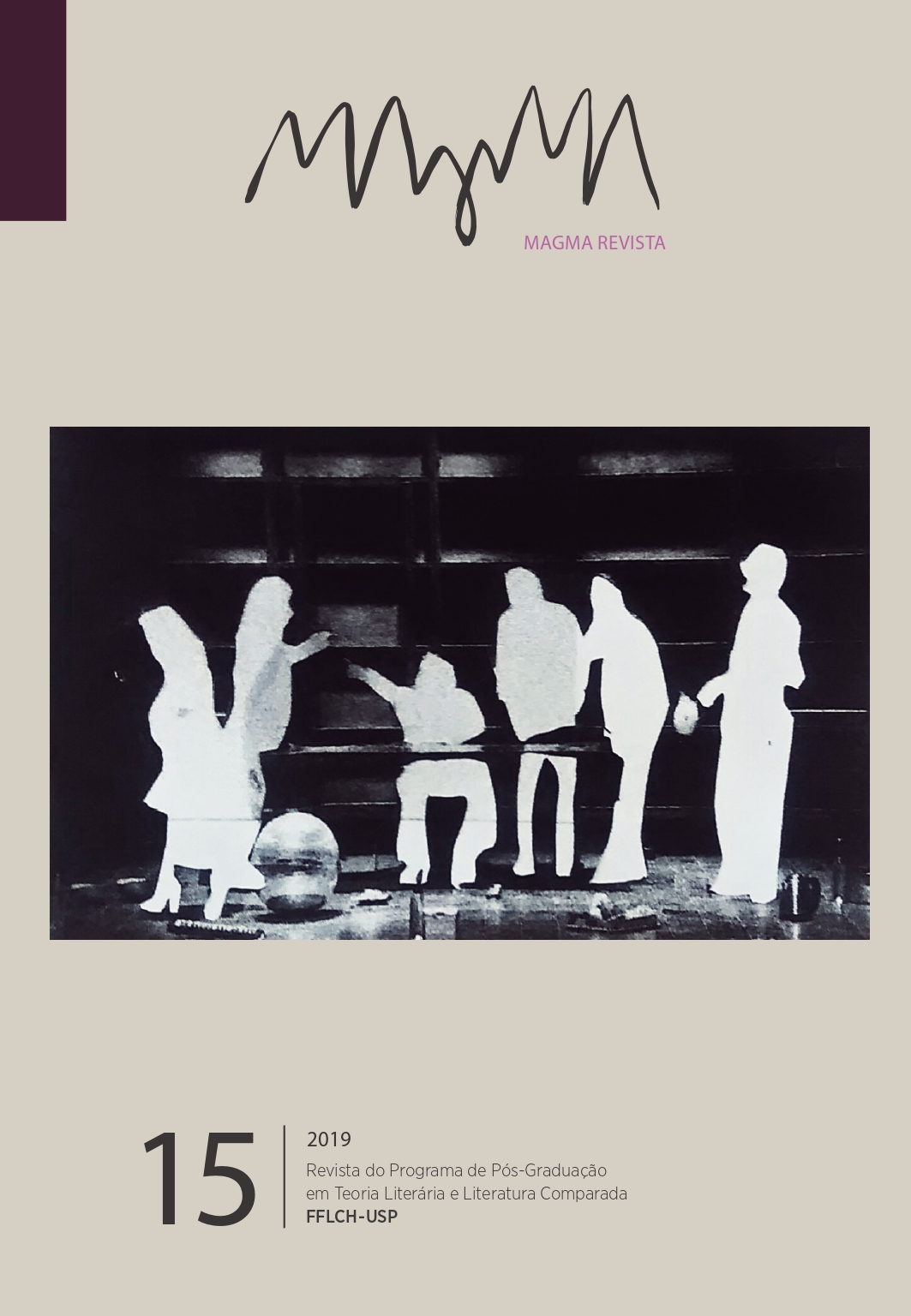The crisis of the novel according to the essays and the short story “An unwritten novel” by Virginia Woolf
DOI:
https://doi.org/10.11606/issn.2448-1769.mag.2019.174028Keywords:
Virginia Woolf, Novel, Short story, Essay, CharacterAbstract
This article analyzes Virginia Woolf’s short story “An unwritten novel” in view of the discussion proposed by the author in several of her essays regarding the difficulties and the possibilities faced by her contemporaries when writing fiction. What defines the novel, for Woolf, is the attempt to apprehend and represent a character, a term which stands for both a fictional device in the story and for a distinctive aspect of human experience materialized in a real individual and perceived by a novelist. Woolf identifies the need of her own generation of writers to break with the then established novel conventions to, once again, from the representation of a character, reapproximate the novelist, the world, and the reader. The analyzed short story furthers this discussion not through its themes, but in the formal instability of its narrator.
Downloads
References
ADORNO, Theodor. “A posição do narrador no romance contemporâneo”. In: Notas de literatura I. Trad. de Jorge de Almeida. São Paulo: Duas Cidades, Editora 34, 2003. p. 55-63.
BENJAMIN, Walter. “O Narrador”. In: Magia e técnica, arte e política. Trad. de Sérgio Paulo Rouanet. São Paulo: Brasiliense, 1985. p. 197-221.
BENJAMIN, Walter. “Sobre alguns temas em Baudelaire”. In: Obras escolhidas III: Charles Baudelaire, um lírico no auge do capitalismo. Trad. de J. Carlos Barbosa e Hemerson Baptista. São Paulo: Brasiliense, 1989. p. 103-149.
KENNEY JR., Edwin. “The moment, 1910: Virginia Woolf, Arnold Bennett, and Turn of the Century Consciousness”. Colby Library Quarterly. Waterville, n. 1, v. 13, p. 42-66, March 1977.
LUKÁCS, Georg. “O romance como epopeia burguesa”. In: Arte e sociedade: escritos estéticos 1932-1967. 2. ed. Trad. de Carlos Nelson Coutinho e José Paulo Netto. Rio de Janeiro: Editora UFRJ, 2009. p. 193-243.
MCKEON, Michael. “Generic transformation and social change: rethinking the rise of the novel”. In: DAMROSCH, Leopold. Modern essays on eighteenth-century literature. New York, Oxford: Oxford University Press, 1988. p. 159-180.
PIGLIA, Ricardo. “Teses sobre o conto”. In: Formas breves. Trad. de José Carlos Mariani de Macedo. São Paulo: Companhia das Letras, 2004. p. 87-94.
WATT, Ian. “Realism and the novel form”. In: The rise of the novel: studies on Defoe, Richardson, and Fielding. Berkeley & Los Angeles: University of California Press, 1962. p. 9-34.
WOOLF, Virginia. “An unwritten novel”. In: The complete shorter fiction of Virginia Woolf. Organização e notas de Susan Dick. San Diego: Harcourt, 1989. p. 112-121.
WOOLF, Virginia. “Character in fiction”. In: Selected essays. Oxford: Oxford University Press, 2008a. p. 37-54.
WOOLF, Virginia. “How it strikes a contemporary”. In: Selected essays. Oxford: Oxford University Press, 2008b. p. 23-30.
WOOLF, Virginia. “Modern Fiction”. In: Selected essays. Oxford: Oxford University Press, 2008c. p. 6-12.
WOOLF, Virginia. “Mr. Bennett and Mrs. Brown”. In: Selected essays. Oxford: Oxford University Press, 2008d. p. 32-36.
WOOLF, Virginia. “The decay of essay-writing”. In: Selected essays. Oxford: Oxford University Press, 2008e. p. 3-5.
Downloads
Published
Issue
Section
License
Autores que publicam nesta revista concordam com os seguintes termos:
- Autores mantém os direitos autorais e concedem à revista o direito de primeira publicação, com o trabalho simultaneamente licenciado sob a Licença Creative Commons Attribution CC-BY-NC-ND que permite o compartilhamento do trabalho com reconhecimento da autoria e publicação inicial nesta revista.
- Autores têm autorização para assumir contratos adicionais separadamente, para distribuição não-exclusiva da versão do trabalho publicada nesta revista (ex.: publicar em repositório institucional ou como capítulo de livro), com reconhecimento de autoria e publicação inicial nesta revista.
- Autores têm permissão e são estimulados a publicar e distribuir seu trabalho online (ex.: em repositórios institucionais ou na sua página pessoal) a qualquer ponto antes ou durante o processo editorial, já que isso pode gerar alterações produtivas, bem como aumentar o impacto e a citação do trabalho publicado (Veja O Efeito do Acesso Livre).



